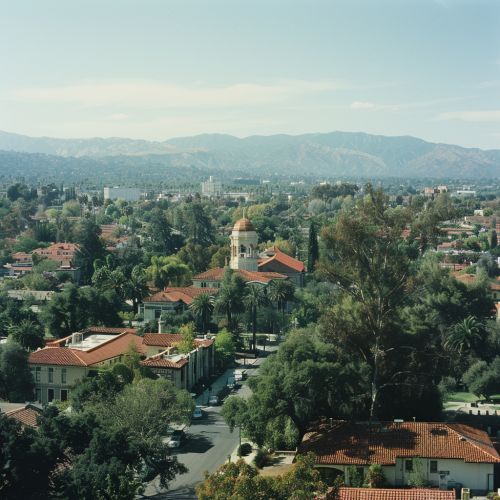Octavia E. Butler: Difference between revisions
No edit summary |
No edit summary |
||
| Line 3: | Line 3: | ||
Octavia Estelle Butler was born on June 22, 1947, in [[Pasadena, California|Pasadena]], California. She was the only child of Octavia Margaret Guy, a housemaid, and Laurice James Butler, a shoeshiner. Her father died when she was very young, and she was raised by her mother and maternal grandmother in what she would later recall as a strict Baptist environment. | Octavia Estelle Butler was born on June 22, 1947, in [[Pasadena, California|Pasadena]], California. She was the only child of Octavia Margaret Guy, a housemaid, and Laurice James Butler, a shoeshiner. Her father died when she was very young, and she was raised by her mother and maternal grandmother in what she would later recall as a strict Baptist environment. | ||
[[Image:Detail-78891.jpg|thumb|center|A view of Pasadena, California, the birthplace of Octavia E. Butler.]] | [[Image:Detail-78891.jpg|thumb|center|A view of Pasadena, California, the birthplace of Octavia E. Butler.|class=only_on_mobile]] | ||
[[Image:Detail-78892.jpg|thumb|center|A view of Pasadena, California, the birthplace of Octavia E. Butler.|class=only_on_desktop]] | |||
== Education == | == Education == | ||
Latest revision as of 02:21, 16 May 2024
Early Life
Octavia Estelle Butler was born on June 22, 1947, in Pasadena, California. She was the only child of Octavia Margaret Guy, a housemaid, and Laurice James Butler, a shoeshiner. Her father died when she was very young, and she was raised by her mother and maternal grandmother in what she would later recall as a strict Baptist environment.


Education
Butler was diagnosed with dyslexia at an early age, but her mother encouraged her to persevere with her education. She attended Pasadena City College, where she won a college-wide short story contest, and later enrolled at California State University, but left before completing her degree. She also attended a number of writing workshops, including the Open Door Workshop of the Screenwriters' Guild, where she met science fiction writer Harlan Ellison, who encouraged her to pursue a career in writing.
Writing Career
Butler began writing science fiction at a young age, but it was not until she was in her mid-twenties that she began to publish her work. Her first novel, Patternmaster (1976), was the first in a series of works that she would later group under the title of the Patternist Series. This series, which includes Mind of My Mind (1977), Survivor (1978), Wild Seed (1980), and Clay's Ark (1984), explores themes of power dynamics, gender, sexuality, and the ethics of genetic manipulation.
In 1984, Butler published Kindred, a novel that straddles the line between science fiction and historical fiction. The novel tells the story of a modern African-American woman who is transported back in time to the antebellum South, where she must save the life of a white slave owner who is her ancestor. Kindred is now widely regarded as a classic of African-American Literature and is frequently taught in high schools and colleges.
Butler's later works, including the Xenogenesis trilogy (1987–1989) and the Parable series (1993–1998), continue to explore themes of race, gender, and power, often through the lens of speculative fiction. Her work is characterized by its focus on marginalized characters and communities, its exploration of the ethics of power and oppression, and its visionary imagining of alternative social and political structures.
Recognition and Legacy
Over the course of her career, Butler received numerous awards for her work. In 1984, she was the recipient of the Hugo Award for Best Short Story for her work "Speech Sounds". In 1985, she received the Nebula Award for Best Novelette for "Bloodchild", which also won the Hugo Award in 1986. In 1995, she became the first science fiction writer to receive the MacArthur Fellowship, often referred to as the "Genius Grant".
Butler passed away on February 24, 2006, but her legacy continues to be felt in the field of science fiction and beyond. Her work has been influential in the development of Afrofuturism, a cultural aesthetic that combines science fiction, history, and fantasy to explore the African diaspora. Her novels and short stories continue to be widely read and studied, and her influence can be seen in the work of a new generation of science fiction writers.
